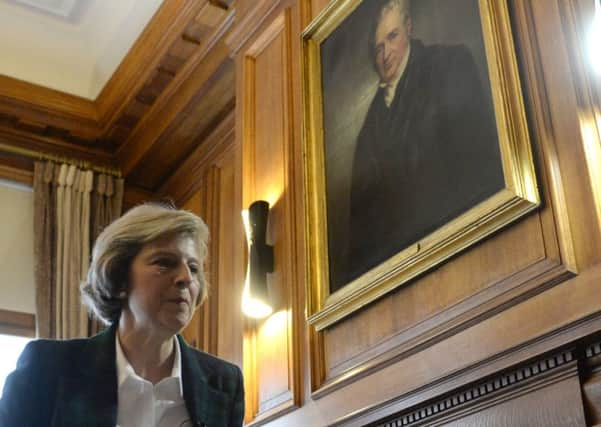May urges country to ditch human rights rules, but not EU


EU law enforcement arrangements such as the European Arrest Warrant have bolstered UK powers, she claimed, and to leave such a vital network now would put the UK at risk.
However the ECHR “bind” the Government and “adds nothing to our prosperity”, she said.
Advertisement
Hide AdAdvertisement
Hide AdShe cited how over the past five years the arrest warrant has been used to extradite more than 5000 people to Europe while bringing hundreds of suspected or wanted individuals to face justice in the UK.
Mrs May, who kept fellow cabinet colleagues guessing on her position on Europe until February, said there are also benefits of sharing of criminal records and biometric data with other EU states.
She said: “They help us to turn foreign criminals away at the border, prevent money laundering by terrorists and criminals, get foreign criminals out of our prisons...investigate cases that cross borders, and share forensic data like DNA and fingerprinting much more quickly.”
However her claims on the value of the warrant have been criticised by Brexit campaigner and Shipley MP Philip Davies.
Advertisement
Hide AdAdvertisement
Hide AdInformation he has recieved from London’s Met Police through a Freedom of Information request shows that in 2015 the force charged 11,285 EU nationals, not including UK citizens, with a range of crimes.
In 2014, they charged 12,266 EU nationals and in 2013, the figure was 13,087.
He said: “Extraditing 5000 people pales into insignificance when it comes to the number of EU criminals that are allowed to come into our country.
“The Met have charged 11, 285 people and that’s just the London Met. These figures show the absurdity of Theresa May’s position.”
Advertisement
Hide AdAdvertisement
Hide AdHe said that far more European criminals arrive in Britain because of the country’s membership of the EU and its associated freedom of movement policy than are extradited back to their home nations every year.
“I’m not a big fan either of British citizen being carted off to a foreign country just on the say so of an EU country whose rule of law isn’t as strong as ours.
“This used to be something David Cameron used to think himself before he became Prime Minister,” said Conservative MP Philip Davies.
While backing EU membership, Mrs May said she was not convinced that membership of the European Convention on Human Rights enhances British law. This set of guiding principles were part-founded by Britain in the 1950s following the Second World War and are overseen by the European Court of Human Rights in Strasbourg.
Advertisement
Hide AdAdvertisement
Hide AdOnly a British Bill of Rights would give UK citizens total protection she said, returning to a policy pledged in the Conservative manifesto in 2015.
The treaty “can bind the hands of Parliament”, “adds nothing to our prosperity” and “makes us less secure by preventing the deportation of dangerous foreign nationals”, she argued.
“If we want to reform human rights laws in this country, it isn’t the EU we should leave but the ECHR and the jurisdiction of its court,” the minister said.
She said: “Because, despite what people sometimes think, it wasn’t the European Union that delayed for years the extradition of Abu Hamza, almost stopped the deportation of Abu Qatada, and tried to tell Parliament that - however we voted - we could not deprive prisoners of the vote. It was the European Convention on Human Rights.”
Advertisement
Hide AdAdvertisement
Hide AdBella Sankey, Policy Director for Liberty, described her attack on the ECHR as desparate.
She said: “Britain founded it, it is the most successful system for the enforcement of human rights in the history of the world, and every day it helps bring freedom, justice and the Rule of Law to 820 million people.”
The Vote Leave group, which is leading the campaign to quit the EU, said Mrs May had in her speech clearly made the case to block further EU expansion to Turkey after mentioning her concern that the EU could end up with a land border with Iraq and Syria.